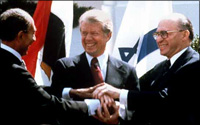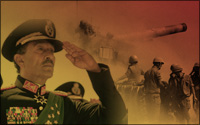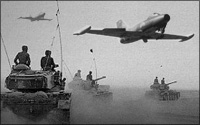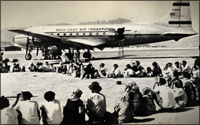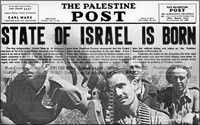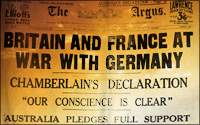 The Second World War was the most cataclysmic war in the history. It killed tens of millions, changed the face of civilization and unleashed forces undreamed of in their potential and terror. It was also a war against unadulterated evil. If a war could be called just, it was the Allied efforts against Hitler.
The Second World War was the most cataclysmic war in the history. It killed tens of millions, changed the face of civilization and unleashed forces undreamed of in their potential and terror. It was also a war against unadulterated evil. If a war could be called just, it was the Allied efforts against Hitler.
On September 1, 1939, the war began when massed German forces crossed the border into Poland. England and France had pledged to come to Poland’s aid in such an event, and after in inexcusable delay declared war against Germany. A great wave a fear overcame the Germans, as Hitler’s generals recorded in their diaries which were made public after the war. Had England and France immediately invaded the western provinces of Germany the fate of the world could have been changed. However, they showed no such resolve.
While Germany’s bold actions and tactics became known as a blitzkrieg (“lightening war”), the actions of England and France were sarcastically referred to as a sitzkrieg (“sitting war”).
Their inaction gave Germany a free hand to overwhelm the Polish army. It also gave German’s generals tremendous experience employing their revolutionary new military tactics, experience they would use to devastating effect later against the Allies. Germany’s air force, the Luftwaffe, terrorized not only the Polish army, but defenseless civilians – both those fleeing the carnage and those in Poland’s cities and villages. They especially targeted Jewish sections of the cities and villages, including extra sorties on Jewish holidays like Rosh Hashannah and Yom Kippur.
As German forces overran Poland, the world stood aghast, but there was little anyone could do. The entire war was over in a month.
Hitler now turned his attention – and his army – west.
The Rise of Churchill
On May 10, 1940, Hitler invaded Belgium, which crumbled in a matter of days. After subduing the Belgians faster than anyone believed possible, the Germans then did the unthinkable and attacked France through the Ardennes Forest, a supposedly impassable natural barrier. The panzers burst out of the forest and ripped through French lines. The mighty French army – the largest standing army in Europe — was completely broken in a week.
The French summoned one of their heroes in the First World War, General Philippe Petain, who said they had no choice but to surrender, and on June 22, 1940, the French officially surrendered. The new head of France was a right-wing, anti-Semitic fascist by the name of Pierre Laval. They moved the seat of government in Paris, which was occupied, to the unoccupied Vichy province. France was out of the war.
As the French fell apart, the British continued fighting, but their army was trapped and began a slow retreat to a port where they hoped to evacuate as many troops as possible: Dunkirk. In what would become known as “The Miracle of Dunkirk,” more than 300,000 soldiers were rescued in 10 days. Every imaginable boat that could float was used to cross the channel and pick up stranded troops 24 hours a day without let up. All the while they were fired upon and bombed from the air. Thousands were killed and drowned. Nevertheless, it was a miracle how many survived.
In hindsight, Dunkirk was the beginning of victory for the Allies. Had the British army not been rescued there its army would have been gone, its spirit crushed, and the British government may well have surrendered. When Prime Minister Winston Churchill got up in the House of Commons to speak about it he received a standing ovation. However, in his confident yet sober tone he informed the British people, “Wars are not won by evacuations.”
Churchill, more than any individual, rallied the British to war. He could capture the hearts and minds of people with a word or a gesture. His gift for the turn of a phrase, his magnificent choice of words and his grand eloquence became legendary. “We shall fight on the beaches,” he thundered. “We shall fight in the fields and in the streets, we shall fight in the hills; we shall never surrender….”
Churchill is an example of how the Almighty chooses a person and nurtures him for the right moment. For decades, Churchill had been in the “wilderness” of British politics. He was the odd man out, even as late as 1938. Incredibly, despite his success leading the nation during the war, he was voted out of office as soon as the war was over.
Roosevelt
In the United States, Franklin Roosevelt recognized Hitler for the threat he was and knew he needed to be stopped, but he could not express that openly because public sentiment was strongly opposed to war. Americans did not want to get involved in another war between Europeans, Churchill’s speeches notwithstanding. They refused to admit how global the conflict really was, and how it would come to their doorstep whether they liked it or not.
Politically, the Isolationists in America wielded great power. Their viewpoint was abetted by rampant anti-Semitism in the United States. Father Charles Coughlin was a popular radio host who ranted against the Jews and praised Hitler. The German-American Bund marched in the streets.
Roosevelt, nevertheless, positioned himself for war as much as possible. In his Lend-Lease program he gave England 50 American destroyers. It was not so much for the worth of the destroyers, which were old, but for the psychological message it sent.
Roosevelt also broke with tradition and ran for a third term. No president before or since has ever been elected for more than two terms. He felt that he was God’s instrument and was indispensable to the Western world.
The Battle of Britain
As Hitler considered plans for the invasion of England, the German air force tried to crush the British into submission through air power, what became known as the Battle of Britain. London was bombed heavily for months. The British sustained tremendous civilian casualties.
Despite that, it became a rallying point and only stiffened British resolve. Against all odds, the British air force decimated the German air force, which would never be the same. Once again the immortal words of Churchill summed it up best: “Never in the history of mankind have so many owed so much to so few.”
The British victory in the Battle of Britain meant that Germany’s plans for an invasion of England would have to be scrapped. Although isolated, the island nation now became a dangerous foe on the Nazi Empire’s western front.
Operation Barbarossa
To this point, Hitler had led the Germans to victory, but now he would lead them – through his own conceit and madness – to defeat. Hitler convinced himself that he was a military genius and that he knew better than his generals. If he had listened to them, he reasoned, Germany would not have won decisive battles in Poland and France. He was the cause of victory.
Despite the danger of a two-front war, he was anxious to take over Russia in order to destroy the communists and annihilate its two to three million Jews. Therefore, he authorized Operation Barbarossa, the invasion of Russia.
On June 22, 1941, Germany launched the attack. It caught the Russians completely by surprise and was devastating. In a month some two million Russians were killed, wounded or captured! German troops pushed to the outskirts of Leningrad in the north, Smolensk (18 miles west of Moscow) in the center and Kiev in the south. Russia was prostrate. Everyone expected them to surrender. Stalin almost suffered a nervous breakdown. His ministers made plans to evacuate Moscow and move to the Ural Mountains.
But Hitler had overextended himself. The supply lines from Germany stretched more than 1500 miles. The roads and railways (where they existed) were bad – and then winter set in. It was the coldest, bitterest winter in a century. The German troops were caught with summer clothing. They never expected to fight into the winter.
Stalin, with brute force, was able to raise another two to three million men and throw them into the breach. The German offensive stalled.
Day of Infamy
At this time, the United States had economically provoked Japan in such a way that, frightened for its own interests, militarists came to power. On December 7, 1941, they attacked the American Pacific fleet stationed in Pearl Harbor. The news galvanized Americans of all types.
The United States immediately declared war on Japan — not Germany. There was still not much sentiment to declare war against Germany. However, Hitler could not control himself and declared war against America. Congress in turn declared war against Germany and the world war was on.
The United States would prove to be the weight that decided the war against Germany. Winston Churchill wrote in his memoirs that he went to sleep on December 7, 1941, for the first time in eight years knowing that the Western world was saved.
End of the Thousand Year Reich
In the summer of 1942, Hitler authorized an attack designed to deliver a killer blow to Russia. His forces would push all the way to Stalingrad, the key city to Russia’s natural resources in the south.
After a titanic struggle, in what would be the bloodiest battle in history, the Russians prevailed at Stalingrad. It marked the end of Germany’s domination of Russia. There would still be years of fighting and millions of casualties, but the fate of Germany was sealed.
By early 1944, the Russians reached the borders where they had been at the beginning of the war. As the German army was retreating in the east, the Allied launched the amphibious invasion of Normandy in the west on June 6, 1944, “D-Day.” It was the largest and most complicated sea to land invasion in history. After some staunch German resistance, they finally broke through and rampaged through the countryside until they recaptured Paris and liberated all of France.
At the end of 1944, Germany would mount a short-lived but successful surprise attack in what became known as The Battle of the Bulge, but strategically it was all over. The German army was decimated and running out of fuel. Its production centers and major cities were almost completely obliterated by Allied bombing. Germany was at its knees.
As the end approached, Hitler and other leading Nazis moved into a series of reinforced, underground bunkers in Berlin. They were living in a fantasy land, convinced that they would yet be saved by the United States who would see the inescapable logic of making peace with Germany and attacking Russia. Hitler never could understand how deep the hatred toward him and everything he stood for was. The Nazis never really appreciated the evil they had done. It is almost incredulous.
Hitler committed suicide at the end of April 1945 and Germany officially surrendered on May 7. The war in Europe was over.
Into the Atomic Age
In April, 1945, Franklin Roosevelt died while still in office. Vice President Harry Truman took his place. Again, it was one of God’s “accidents.” One can see God’s hand in the promotion of this little known senator to the most powerful position in the world.
It was Truman who was bequeathed the terrible decision whether or not to drop the atom bomb on Japan. He decided that he was not going to risk a million American casualties and authorized the bombing of Hiroshima and Nagasaki. In August 1945 the war with Japan was over as well.
The world was a smoldering ruin. How it was reconstructed, especially the Jewish world, will be the topic of the next few articles.

